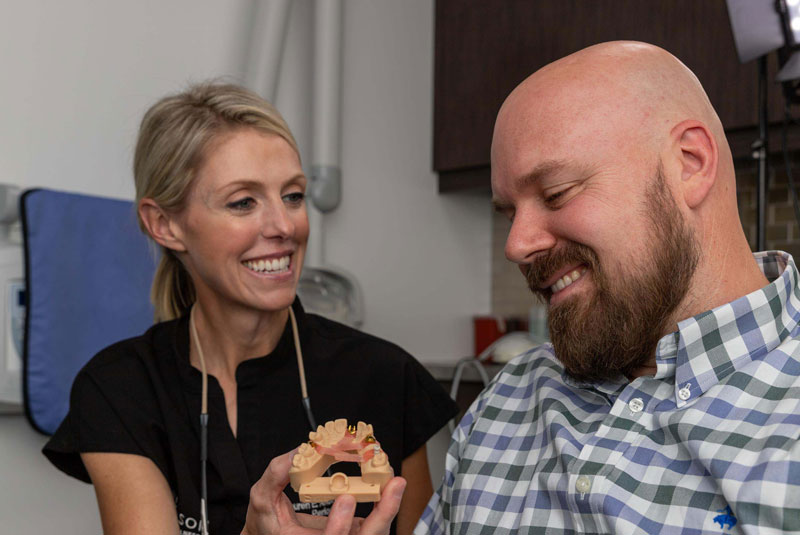Failing dental implants can be caused by a number of reasons, the most common is from peri-implantitis. Similar to gum disease, peri-implant disease is a condition that threatens the longevity of a dental implant, potentially leading to loss of the implant if left untreated.
Peri-mucositis is characterized by inflammation localized to the gum tissues surrounding an implant. Without proper care, peri-mucositis may progress to peri-implantitis, a more serious form of the condition that invades the underlying bone.
The primary cause of failing dental implants, peri-implantitis may result from factors like bacterial accumulation, plaque and tartar buildup, excess dental cement, smoking, diabetes and other systemic concerns.
We can help put an end to your painful and discouraging symptoms with full mouth solutions that fit your lifestyle, smile goals, and budget!
Many symptoms of peri-implantitis do not manifest until the disease has progressed, which highlights the need for regular dental cleanings and exams for early diagnosis and triage. Signs or symptoms of an implant problem should be evaluated in a timely manner to prevent further degeneration of oral tissues.
A skilled implant dentist, Dr. Anderson has extensive expertise in peri-implantitis therapy, and has authored professional publications on the topic of implant disease management. She offers laser and non-laser options for treating peri-implantitis.
Dr. Anderson uses our BIOLASE® WaterLase™ laser to perform Laser REPAIR peri-implantitis treatment. With this minimally invasive technique, she eradicates harmful bacteria and diseased tissue from around the implant, creating a healthier environment. Laser treatment also helps stimulate tissue regeneration, improving the prognosis of dental implants presenting with destructive peri-implantitis.
With a traditional approach, Dr. Anderson gently retracts the gum tissue surrounding an implant, gaining access to the implant screw and surrounding bone. This enables mechanical debridement of plaque, tartar and bacterial buildup to clear the implant of surface irritants and neutralize the unhealthy environment. Anti-microbial medications and chemical therapeutics may also be placed within the space immediately surrounding the implant to eradicate bacteria.

She and our team are proud to deliver patient-centered care customized for your unique oral health needs.
I understand the information disclosed in this form may be subject to re-disclosure and may no longer be protected by HIPAA privacy regulations and the HITECH Act.
